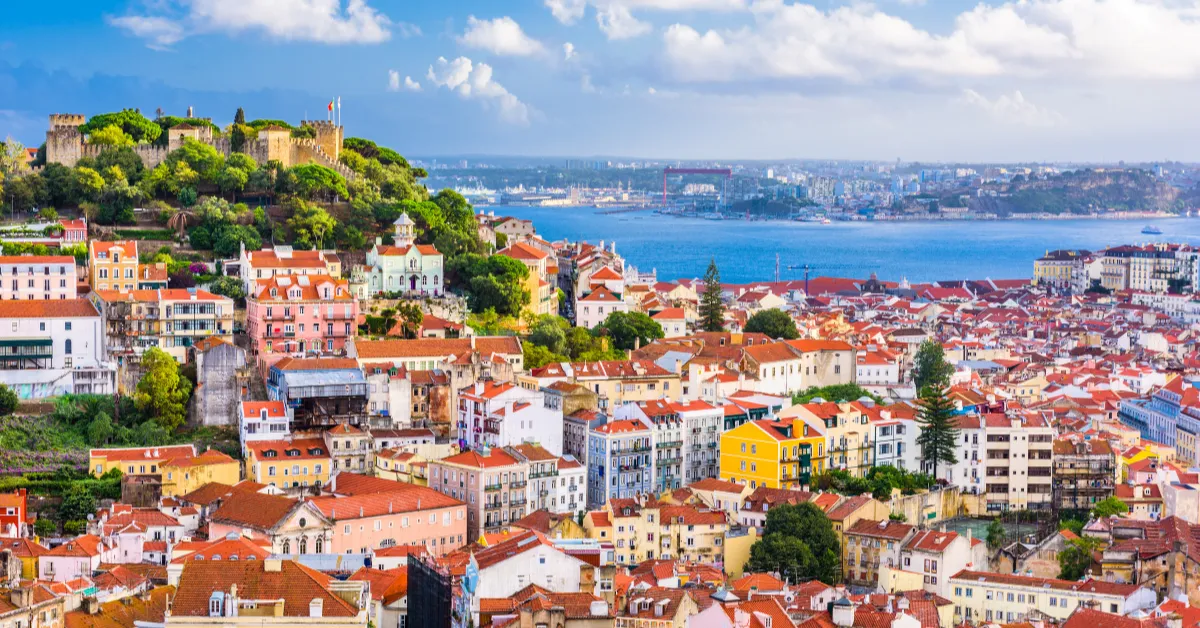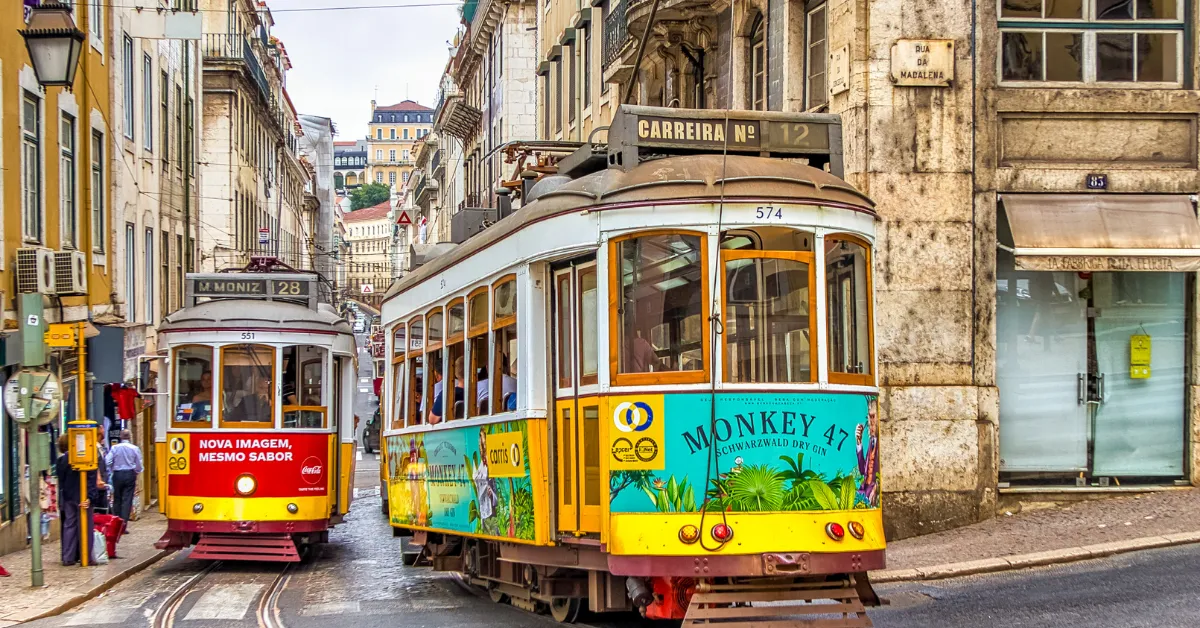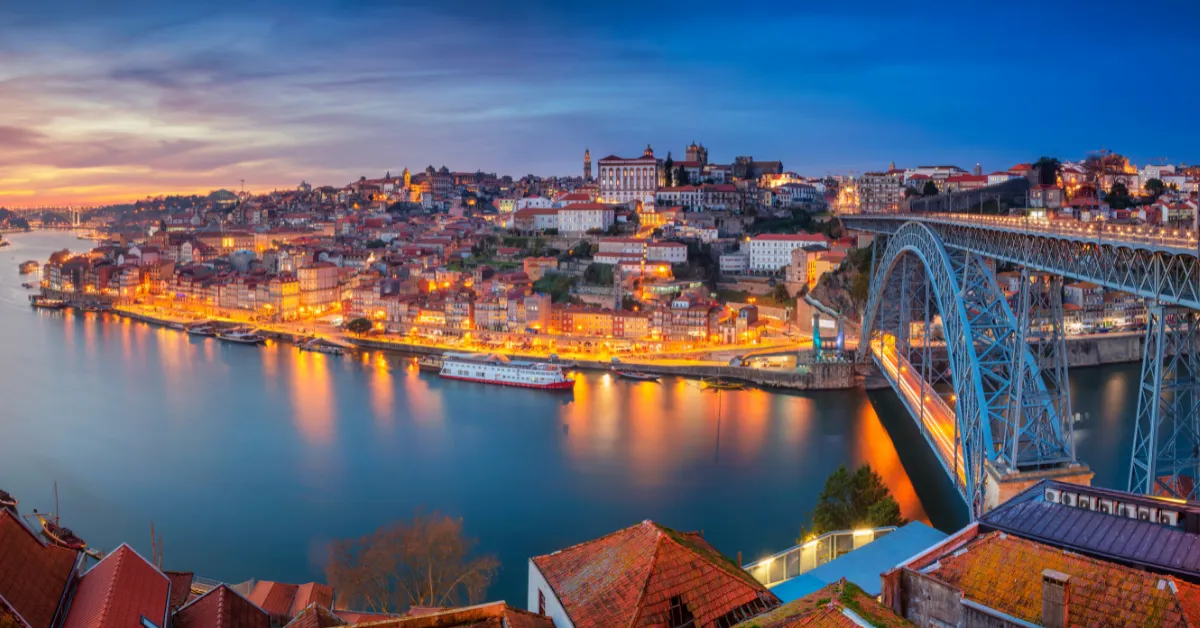Portugal is one of the best places in the world for nomads and is arguably the most enticing spot for remote workers in Europe.
I mean, there’s even an entire digital nomad village…can any other countries beat that?!
In this digital nomad Portugal guide, we’re helping you to find out whether Portugal is the place to tuck your suitcase away for a while and enjoy working from one of its bustling cities or beckoning beaches.
We cover the top towns and cities to live in, when you should visit, how to get around, and the best coworking spaces, to give you an idea of what life in Portugal is like for digital nomads.
Where To Live In Portugal
Portugal is a big country, with hundreds of different towns that we can guarantee you would love to live in. If you’re having trouble deciding where to stay in Portugal, we’ve narrowed it down to 4 destinations that have great WiFi, coworking spaces, and a thriving nomad community to join.
Lisbon
Lisbon has everything that a nomad living in Portugal could ever need. There’s a sense of community, plenty of coworking spaces, great nightlife, and fast WiFi.
A lot of the co-working spaces in Lisbon have co-living accommodation options which help remote workers to meet other people easily.
Plenty of nomads choose to live in the Alfama neighborhood which has tons of great apartments to let on Airbnb. Other neighborhoods to consider include Alcântra and Campo de Ourique.
Porto
For digital nomads in Portugal who are looking for a cheaper and quieter alternative to Lisbon, Porto is the perfect fit. While it doesn’t have as big a freelancer community as the capital city, Porto is up and coming as a prime location for digital nomads, with loads of great cafés, co-working spaces, and accommodation options to choose from.
Porto is located in the north of the country where the weather is cooler and wetter throughout the winter, so bear that in mind when considering Porto as a place to live.
Peniche
If you prefer the beach bum lifestyle, Peniche is the place for you. A little surfing town nestled on the west coast, Peniche has that small-town charm, and even if you don’t know how to surf, you’ll have a great time learning.
Though there are not as many amenities here as there are in other locations in the country such as Lisbon and Portugal, there is a small, close-knit community of nomads that live in the town, which will only continue to grow.
Braga
Braga is a much smaller city than the other two that we’ve mentioned and is perfect for nomads who love the city lifestyle but need to focus on their business with zero distractions.
The city is very religious, and is in fact known as the ‘Rome of Portugal‘. With lots of culture, fewer tourists than other big cities, and fewer attractions pulling you away from your work, Braga pulls in digital nomads from all over.
The city is especially good for those who are traveling alone as it’s an exceptionally safe place.
Other awesome places for nomads in Portugal include Lagos, Coimbra, Madeira, Faro, Aveiro, Sutra, Funchal, and Albufeira. Learn more about the best places to live in Portugal.
Best Time To Be In Portugal
Deciding when to visit Portugal really comes down to personal preference. As the country is based in the northern hemisphere, it experiences chilly winters similar to the rest of Europe.
Temperatures drop to around 17°C in the winter months which is milder than other parts of Europe, but it’s also stormy and we would advise choosing to spend your winters in a more tropical climate such as Mexico or Southeast Asia.
The spring and autumn months are, in our opinion, the best times to base yourself in Portugal, when the summer crowds are nowhere to be seen, and the temperatures sit between 20-25°C.
If you’re a lover of sunny weather but hate the humidity of other tropical destinations, you could choose to spend a few months in Portugal in the summer and enjoy its hot and dry European climate.
How To Get Around Portugal
There are plenty of ways to get around Portugal. If you’re based in a city, this might not be a worry for you at all. Most cities are walkable, and the many historic and cultural sites around mean that you’ll never have a dull stroll.
Train
Portugal has an excellent train service that connects the whole country. Those that don’t have a car don’t need to worry about how to travel through the country as the trains are reliable and inexpensive.
It may be reliable, but don’t be expecting the train service to compare to other European destinations, such as the UK.
The trains in Portugal are a little outdated and a tad slow. They can get hot in the summer due to the lack of air conditioning too, but they work.
If comfort is key to you, take the Alpha-Pendular whenever you can, which is the fastest and most luxurious train line in the country, with added features such as TVs and audio channels.
While it may seem like these trains are lightyears ahead of the standard Intercidades, the cost doesn’t reflect this, and tickets usually only cost €1-2 more.
Tram
If you’re staying in Lisbon, you’ll be able to ride on the famous trams that power the city. 63 trams operate around Lisbon every day, including public trams and tourist trams.
The benefit of the tourist ones is that they stop at the major attractions, but the drawback is they can get very busy. The 28 line is the most popular as it passes through a lot of the historical sites and crosses the city, traveling through the Alfama, Baixa, and Chiado districts.
All trams cost around €3 per ticket, or you can buy a daily transit pass that enables you to travel on any tram, metro service, or bus in the city for under €7.
Bus
Believe it or not, the buses in Portugal are quicker than the trains. Because of this, they’re also a little more expensive, but still very affordable.
There are 2 types of trains running in the country — the small and uncomfortable local buses, which trundle between little towns, and the big coaches that connect different areas of the country.
Use the Rede Expressos website to look up timetables and book the longer journeys made by the coach. You can also get your ticket sent to your email and flash your e-ticket when you hop aboard, which makes traveling a little easier.
It’s worth noting that local buses often won’t have bus timetables available online or at the bus stops. The best place to gain this information is at tourism centers.
Car
While a car is not necessary to travel around the country, if you want to travel in comfort, or are planning an almighty road trip (since you are location independent, after all) you might choose to hire a car while you’re living in Portugal.
There are plenty of scenic spots that you might miss if you’re traveling by train or bus, and with a car, you have the freedom to pull over and seek out one of Portugal’s hidden treasures.
Car hire is very affordable and easy, and you won’t have trouble hiring from an internationally known company.
If you are living in one of the big cities such as Lisbon or Porto, we don’t recommend hiring a car as public transport is so good.
Best Coworking Places In Portugal
This wouldn’t be a digital nomad Portugal guide if we didn’t mention the best coworking spots that you can use if you hate working from your apartment.
Second Home, Lisbon
Second Home in Lisbon is one of the most Instagram-worthy coworking spaces we’ve seen.
With plants stuffed in every nook and cranny, the space gives off an outdoor working vibe, with all the comforts of working inside.
There are lots of community events designed to help you get to know fellow nomads, such as a weekly surf club and a wellness program.
Day passes aren’t yet available, but monthly memberships start at just over €235 plus IVA, and the co-working space is open from 8 AM to 10 PM Monday-Friday.
Typographia, Porto
There are a number of coworking spaces in Porto, but Typographia Porto is one of the best.
Located in the heart of the city, its environment suits different types of workers, with fixed workstations and shared desks, as well as sofas for those who find it easier to work when they feel relaxed.
There are also common areas for eating and chatting, and the space is open 9 AM until 1 PM and 2 PM until 6 PM on weekdays.
Pricing starts at around €15 per day and monthly passes are between €70-€120.
Largo Space, Peniche
While coworking in Portugal is on the rise in most major cities, Peniche has just one coworking spot, Largo, and luckily, it’s a good one.
Peniche’s main draw is that it’s cheaper than other locations around Portugal, which is why nomads flock to the region. The spot has a family feel to it, and it’s easy to make friends while working.
Largo Space is open 24 hours a day, which suits remote workers for companies in different time zones.
ER Braga, Braga
ER Braga is a traditional workspace located centrally in Braga. Members can use the kitchen and have access to the site 24/7.
Day passes are €19 and monthly prices start from €150. Nomads rave about the customer service at ER.
Final Thoughts On Living As A Nomad In Portugal
Although plenty of countries on the continent are making waves as upcoming digital nomad hotspots, Portugal has got to be one of the best countries in Europe for remote workers.
We hope this digital nomad Portugal guide has helped you whittle down your list of destinations and know what to expect from living in the country.
If you’re a digital nomad, check out these posts:
Do you have your travel insurance?
- ☑ SafetyWing offers affordable travel medical insurance. Prices start at $45.08 / 4 weeks.
- ☑ Created by nomads, for nomads.
- ☑ Covers quarantine and Covid-19.
- ☑ You can pay per month, and stop at anytime.




